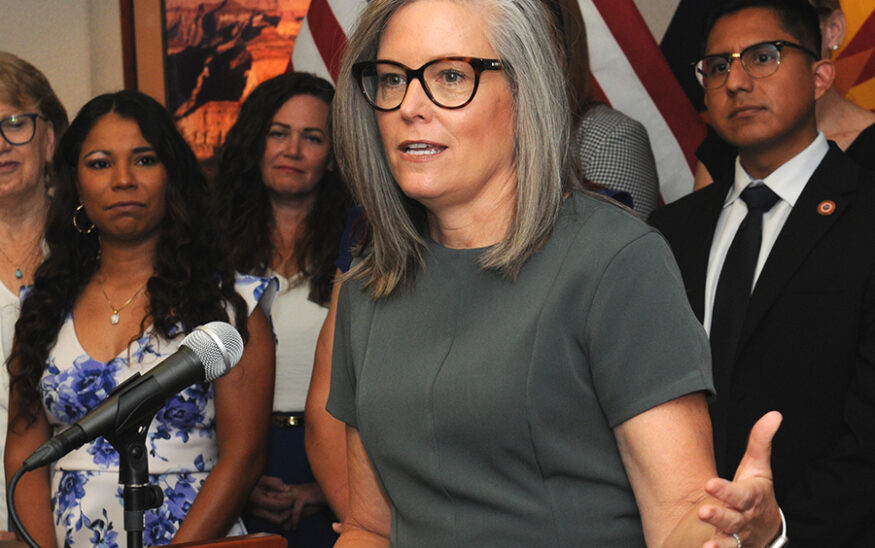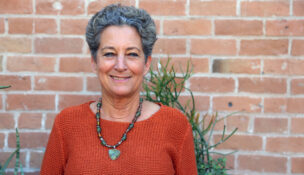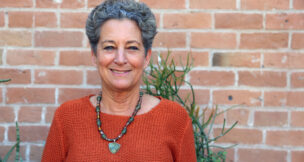Commission sends Hobbs candidates for her Supreme Court justice appointment
Kiera Riley Arizona Capitol Times//December 9, 2024//
Commission sends Hobbs candidates for her Supreme Court justice appointment
Kiera Riley Arizona Capitol Times//December 9, 2024//
Gov. Katie Hobbs will have a pool of two judges and three high-ranking government attorneys to choose from for her first appointment to the Arizona Supreme Court.
Politically, the pool consists of three Democrats and two independents.
After eight interviews, discussion and a vote on Monday, the Commission on Appellate Court Appointments forwarded Court of Appeals Judges Maria Elena Cruz and Andrew Jacobs, Deputy Solicitor General Alexander Samuels, Department of Economic Security General Counsel Nicole Davis and Principal Assistant Tucson City Attorney Regina Nassen to Hobbs.
Per constitutional provision requiring no more than 60% of candidates hail from the same party, the commission was stuck between sending between three and five candidates. After preliminary votes and a nomination process, the commission sent Democrats Cruz, Jacobs and Samuels, and independents Davis and Nassen.
With the list en route to the governor, Hobbs will have 60-days to make the first pick to the high court by a Democratic governor in almost two decades. The new justice will fill the vacancy left by the retirement of Justice Robert Brutinel.
The commission whittled an initial list of 17 applicants down to five nominees. Chief Justice Ann Timmer noted the commission was tasked with weighing merit and the diversity of the court, like race, gender, geographic location and types of law practice, while wading through an application, public feedback and interviews.
The committee lobbed uniform questions to all applicants on their goals as a state Supreme Court justice, approach to ambiguous statutes, plan for improving public trust, experience in dealing with public scrutiny, work bridging differences, philosophy on precedence and perceived weaknesses, and a few discretionary questions based on specific candidate experiences and answers.
Before going question by question, members first brought out findings from due diligence investigations, a process that involves probing colleagues, opposing counsel, judges, friends and family. The responses, disclosed before the candidate came in for their interview, ranged from round praise to perceived red flags on a candidates’ ability to take the bench.
Timmer said she encouraged commissioners to take the totality of a candidates’ application.
“I’ve had experiences when I chaired the Pima County and Maricopa County commissions that people could get just so wowed by a terrific interview they would forget to look at their whole body of work and application and experience level,” Timmer said.
She continued, “People really need to think through in the first place, before they even pick up one application, what do you want in a Supreme Court Justice … who really fits what you envision for the court? And people have different ideas on that.”
Timmer recused herself from voting on candidates in line with judicial tradition and to avoid any appearance of a “thumb on the scale.”
Cruz’s addition to the list was unanimous among the 15 commission members. A current Court of Appeals judge and former prosecutor, public defender, private practitioner and superior court judge for Yuma County, Cruz touched on her work holding education sessions with the public in light of public confusion over an animal case, as well as her decision to step into officiate weddings after gay marriage was legalized, contrary to the directive of the presiding judge at the time.
She emerged as a top pick by multiple commissioners in discussion, given her longstanding experience in rural Arizona, and her work in community engagement and public education.
Jacobs saw broad support, too. He touched on his extensive work in the court’s many rulemaking committees, and he took the time to respond to comments from his Court of Appeals colleagues, who claimed him to be “combative,” noting he had just heard of such claims in the course of the application process.
Samuels, 39, was initially flagged by the commission in the first round of review for his age, with one commissioner noting he had not “been on this earth long enough.” But following his interview, he courted greater support.
“Age is not a good proxy for experience. He’s got the experience that we want. Maybe the governor will think his age matters but in terms of our decision on whether he is qualified to be a good judge, a good justice, I think he’s answered that,” commissioner Joel Nomkin, an attorney said.
Commissioners noted Nassen, current principal city attorney for the city of Tucson and former civil deputy county attorney for Pima County, answers to be short and “dry,” but “very matter of fact,” “analytical,” and honest.
The interview with Davis, current general counsel for the Arizona Department of Economic Security, was marked by discussion about a letter from a former colleague critical of Davis. The commission provided scant details on what the letter alleged but noted the highly critical nature and claimed Davis was not working in ADES best interest.
One commissioner said in discussion the letter was an “assault on her ethics, integrity and basically accuses her of violating the law.”
Davis said she was limited in what she could say given the confidentiality of personnel files, but she said it was a dispute that came about during the pandemic when ADES was “charged with implementing programs, some of which came with very little guidance from the federal government.”
The Arizona Capitol Times requested a copy of the letter but had yet to receive a copy by time of publication.
She attempted to remedy the alleged disagreement with her coworker through Human Resources at the time, but she said he walked off the job instead.
Commissioners said they believed Davis was “thrown” and “dispirited” by the letter, sent to her hours before her interview, and generally deemed her interview to be weak. She ended up on the final list, though.
“I’m just going to be blunt if she weren’t an Independent, there’s no way I would consider voting for her. And I think if she ends up on the list, it’s going to be because she’s an independent, not because she’s one of the stronger candidates,” commissioner Kathryn Townsend said.
Beyond Cruz, Jacobs, Samuels, Davis and Nassen, the commission heard from: attorney Andy Gaona, Amy Sells and assistant legislative attorney for the Tohono O’odham nation Doreen McPaul.
Gaona was identified as a qualified contender for the final list but faced some scrutiny from a handful of commissioners after Townsend told the commission she had somebody say Gaona was in the “scorched earth school of advocacy.”
When asked about the comment by Timmer, Gaona said he works to “play nicely in the sandbox as often as I can,” though he noted partisan cases can bring vigorous disagreement.
“There are times when I have had to call an opposing lawyer’s argument frivolous, but I’ve never done that when I did not believe in good faith that I could make that claim,” Gaona said. “That does not represent the entire body of my work, the entire body of how I have dealt with opposing counsel and parties in the past. And I’m very, very proud to have the support of a lot of folks who I have been opposite to in very high profile political cases.”
Some commissioners stepped to Gaona’s support, noting great praise from opposing Republican attorneys Dennis Wilenchik and Kory Langhofer.
McPaul and Sells did not see much support from commissioners in initial votes ahead of the final list nomination. McPaul caught some flak for her lack of recent experience in appellate litigation. Commissioners were complimentary of Sells but noted she lacked experience on the bench.














































